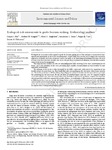Ecological risk assessments to guide decision-making: Methodology matters
| dc.contributor.author | Piet, GJ | |
| dc.contributor.author | Knights, Antony | |
| dc.contributor.author | Jongbloed, RH | |
| dc.contributor.author | Tamis, JE | |
| dc.contributor.author | de Vries, P | |
| dc.contributor.author | Robinson, LA | |
| dc.date.accessioned | 2016-11-25T12:59:45Z | |
| dc.date.available | 2016-11-25T12:59:45Z | |
| dc.date.issued | 2017-02 | |
| dc.identifier.issn | 1462-9011 | |
| dc.identifier.issn | 1873-6416 | |
| dc.identifier.uri | http://hdl.handle.net/10026.1/8023 | |
| dc.description.abstract |
Ecological risk assessment is often applied to guide the decision-making process that underpins ecosystem-based management and prioritisation of risk factors for management. Several studies have recently used ecological risk assessment approaches to identify risk factors of greatest concern, but rarely are the underlying methodological decisions discussed in terms of the effect that those decisions have on the outcome of the assessment and ultimately, how that affects prioritisation of risk factors for management. This study therefore evaluates the effect of methodological decisions involving (1) the choice and definition of risk factors, and (2) the calculation of risk scores, providing, where possible, recommendations on what should be the most appropriate methodologies. The definition of risk factors is often determined by the policy context and could result in the comparison of one broadly defined risk meta-factor (e.g. Food Production) with corresponding specific risk factors defined more narrowly (i.e. Oil and Gas production or Offshore Wind). Depending on the method to calculate risk this may result in a systematic bias prioritising any risk meta-factor. For the calculation of individual impact chain risk scores we compared weighted scores with ordinal scores, where the former allows more flexibility to represent the qualitative categories that determine risk and provided results better supported by scientific evidence. A consideration of different risk assessment applications in EBM showed there is no one-size-fits-all solution to this as these methodological decisions need to be considered in concert and the preferred methodology may depend on the context in which the risk assessment is applied. The outcome of the risk assessment should always be accompanied by an explicit consideration of these methodological issues and description of the resulting methodological choices. | |
| dc.format.extent | 1-9 | |
| dc.language | en | |
| dc.language.iso | en | |
| dc.publisher | Elsevier BV | |
| dc.subject | Ecosystem-based management | |
| dc.subject | Exposure-effect | |
| dc.subject | Sector | |
| dc.subject | Pressure | |
| dc.subject | Ecosystem component | |
| dc.title | Ecological risk assessments to guide decision-making: Methodology matters | |
| dc.type | journal-article | |
| dc.type | Journal Article | |
| plymouth.author-url | https://www.webofscience.com/api/gateway?GWVersion=2&SrcApp=PARTNER_APP&SrcAuth=LinksAMR&KeyUT=WOS:000392691100001&DestLinkType=FullRecord&DestApp=ALL_WOS&UsrCustomerID=11bb513d99f797142bcfeffcc58ea008 | |
| plymouth.volume | 68 | |
| plymouth.publication-status | Published | |
| plymouth.journal | Environmental Science and Policy | |
| dc.identifier.doi | 10.1016/j.envsci.2016.11.009 | |
| plymouth.organisational-group | /Plymouth | |
| plymouth.organisational-group | /Plymouth/Faculty of Science and Engineering | |
| plymouth.organisational-group | /Plymouth/Faculty of Science and Engineering/School of Biological and Marine Sciences | |
| plymouth.organisational-group | /Plymouth/REF 2021 Researchers by UoA | |
| plymouth.organisational-group | /Plymouth/REF 2021 Researchers by UoA/UoA07 Earth Systems and Environmental Sciences | |
| plymouth.organisational-group | /Plymouth/Users by role | |
| plymouth.organisational-group | /Plymouth/Users by role/Academics | |
| plymouth.organisational-group | /Plymouth/Users by role/Researchers in ResearchFish submission | |
| dcterms.dateAccepted | 2016-11-19 | |
| dc.rights.embargodate | 2017-11-30 | |
| dc.identifier.eissn | 1873-6416 | |
| dc.rights.embargoperiod | Not known | |
| rioxxterms.versionofrecord | 10.1016/j.envsci.2016.11.009 | |
| rioxxterms.licenseref.uri | http://www.rioxx.net/licenses/all-rights-reserved | |
| rioxxterms.licenseref.startdate | 2017-02 | |
| rioxxterms.type | Journal Article/Review |


